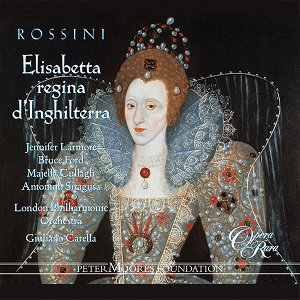
Gioacchino Rossini (1792-1868)
Elisabetta regina d’Inghilterra (1815)
Elisabetta – Jennifer Larmore (mezzo-soprano)
Leicester – Bruce Ford (tenor)
Matilde – Majella Cullagh (soprano)
Enrico – Manuela Custer (mezzo-soprano)
Norfolk – Antonino Siragusa (tenor)
Guglielmo – Colin Lee (tenor)
The Geoffrey Mitchell Choir
London Philharmonic Orchestra/Giuliano Carella
rec. 2002
Opera Rara ORC22 [3 CDs: 154]
The presentation of these Opera Rara sets is always so lavish and thorough. The sound is invariably impeccable, the casts as good as can be assembled and the playing by the LPO is utterly dependable, doing justice to the noticeably enhanced sophistication and variety of Rossini’s orchestration of the kind we first hear in the introduction to Larmore’s entrance (CD 1, track 6), with prominent flute, horn and clarinet parts. Those are already a lot of plusses.
There is, of course, an equally starry alternative studio recording of this opera with Caballé, Masterson and Carreras which I cover in my survey An Eclectic Selection of Rossini Operas, but the Rossini fan will want both. Jennifer Larmore is, in her own Fach, almost as eminent a diva as Caballé and in fact has a voice and range perhaps even better suited to the role of Elisabetta. The timbre of Bruce Ford’s tenor might not have the limpid beauty of the youthful Carreras but he specialised in bel canto coloratura roles and is mightily free and impressive. Majella Cullagh was for many years alongside Nelly Miricioiu the go-to soprano for Opera Rara and possesses formidable technique and musicality. Furthermore, this recording is absolutely complete, whereas the earlier Philips version has some cuts.
The opera is oddly unbalanced in that it cast for three tenors, no lower male voices, two mezzo-sopranos and the customary lead soprano – but that probably has as much to do with the star singers who were available to Rossini in Naples at the time of composition as any artistic choice.
The familiar overture is the same as that recycled a few months later for Il barbiere di Siviglia. After the chorus, the first solo voice we hear is Antonino Siragusa’s rather steely, nasal tenor – but he is very agile and flexible and, after all, the baddie, so a little hardness in his tone is appropriate. He is then joined by Colin Lee, who in 2014 suddenly curtailed a career which had taken him to all the major opera houses, and I find his timbre much more grateful than Siragusa’s. Larmore immediately displays her wide mezzo range from trenchant low notes up to top C and her coloratura facility, deploying her large, “cupped” sound adroitly. The next surprise to the unwary is when she launches into the aria much more widely known – with a few adjustments – as Rosina’s “Io sono docile”, again from Il barbiere – another Rossini recycling; he saw no barrier to taking music composed for an opera seria and using it for an opera buffa. As Jeremy Commons’ expert notes point out, the quality of Rossini’s music improves as the opera progresses and it is indeed peculiar that Leicester, hailed on his return as a conquering hero, has no bravura aria di sortita (in which a character makes a grand entrance) trumpeting his victory – and Bruce Ford would have had just the right voice for that, it being light, bright, virile and flexible. Manuela Custer in the trouser-role of Enrico, Leicester’s brother-in-law (the plot is typically fanciful and ahistorical) has a nice, dark, tough mezzo-soprano, very suitable to the part, Majella Cullagh’s big set piece concluding the Part One of the first act is marvellously sung, compete with a firm and ringing top D, and the duet for Elisabetta and Norfolk is highly dramatic, as is the finale to the act, which features some highly virtuosic singing and evidence of Rossini’s mastery of the big, set piece, stretta ensemble. The confrontation culminating in the duet “Vorrei stemprarti” between Larmore’s Elisabetta and Cullagh’s Matilda in Act II is especially beautiful, as their two fine voices intertwine beguilingly, and this develops into a trio with Ford’s Leicester, making it a vocal highlight; the fast runs in his music hold no terrors for Ford. Siragusa has the most extended and florid display aria “Deh! troncate i ceppi suoi” and he manages it well within the limitations of an essentially rather unattractive voice. Much more grateful is Leicester’s ensuing scene and the dénouement in which Norfolk’s treachery is revealed and Larmore’s Elisabetta vents her fury upon him in a startling display of vocal agility leading up to the unexpected “happy ending”.
This might not be one of Rossini’s most celebrated operas but it contains much to revel in.
Ralph Moore
Help us financially by purchasing from




















